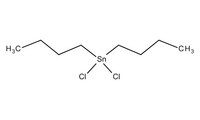804184 Sigma-AldrichDibutyltin dichloride
Dibutyltin dichloride for synthesis. CAS 683-18-1, chemical formula (CH₃CH₂CH₂CH₂)₂SnCl₂.
More>> Dibutyltin dichloride for synthesis. CAS 683-18-1, chemical formula (CH₃CH₂CH₂CH₂)₂SnCl₂. Less<<Synonyms: Dibutyldichlorostannane, Dibutyldichlorotin
Recommended Products
Overview
| Replacement Information |
|---|
Key Spec Table
| CAS # | EC Number | Hill Formula | Chemical Formula | Molar Mass |
|---|---|---|---|---|
| 683-18-1 | 211-670-0 | C₈H₁₈Cl₂Sn | (CH₃CH₂CH₂CH₂)₂SnCl₂ | 303.83 g/mol |
Pricing & Availability
| Catalogue Number | Availability | Packaging | Qty/Pack | Price | Quantity | |
|---|---|---|---|---|---|---|
| 8041840250 |
|
Glass bottle | 250 g |
|
— |
| Description | |
|---|---|
| Catalogue Number | 804184 |
| Synonyms | Dibutyldichlorostannane, Dibutyldichlorotin |
| Description | Dibutyltin dichloride |
| References |
|---|
| Product Information | |
|---|---|
| CAS number | 683-18-1 |
| EC index number | 050-022-00-X |
| EC number | 211-670-0 |
| Hill Formula | C₈H₁₈Cl₂Sn |
| Chemical formula | (CH₃CH₂CH₂CH₂)₂SnCl₂ |
| Molar Mass | 303.83 g/mol |
| HS Code | 2931 90 00 |
| Structure formula Image | |
| Quality Level | MQ200 |
| Applications | |
|---|---|
| Application | Dibutyltin dichloride for synthesis. CAS 683-18-1, chemical formula (CH₃CH₂CH₂CH₂)₂SnCl₂. |
| Biological Information |
|---|
| Physicochemical Information | |
|---|---|
| Boiling point | 148 °C (16 hPa) |
| Density | 1.4 g/cm3 (20 °C) |
| Flash point | 144 - 148 °C |
| Melting Point | 37 - 38 °C |
| Vapor pressure | 0.0016 hPa (25 °C) |
| Solubility | 0.32 g/l |
| Dimensions |
|---|
| Materials Information |
|---|
| Toxicological Information | |
|---|---|
| LD 50 oral | LD50 Rat 50 mg/kg |
| Safety Information | |
|---|---|
| Categories of danger | toxic for reproduction, very toxic, corrosive, mutagenic, dangerous for the environment |
| Product Usage Statements |
|---|
| Storage and Shipping Information | |
|---|---|
| Storage | Store below +30°C. |
| Packaging Information |
|---|
| Supplemental Information |
|---|
| Global Trade Item Number | |
|---|---|
| Catalogue Number | GTIN |
| 8041840250 | 04022536384191 |
Documentation
Dibutyltin dichloride SDS
| Title |
|---|
Dibutyltin dichloride Certificates of Analysis
| Product Number | Packaging | Specification | Lot Number |
|---|---|---|---|
| 8041840250 | Glass bottle | PDF Specification Document |











